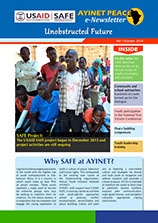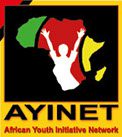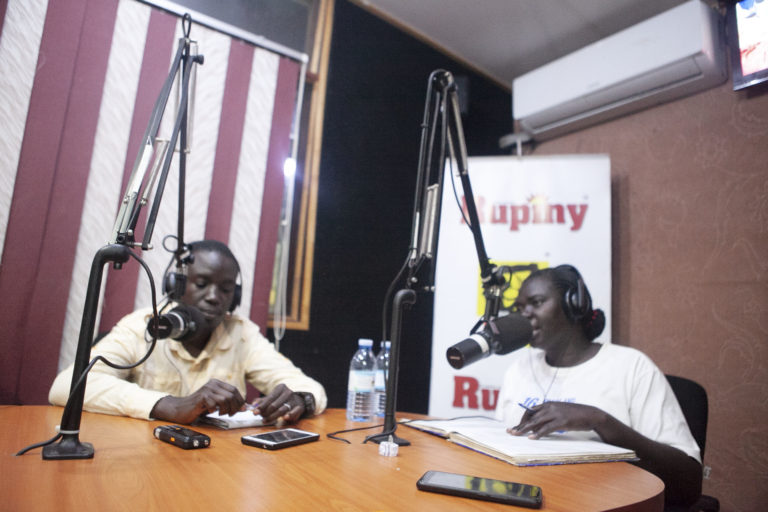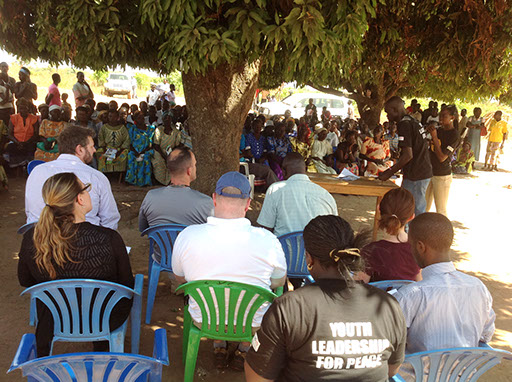With continued support from USAID through Supporting Access to Justice, Fostering Equity and Peace (SAFE), this year 2015, AYINET will continue phase two of the youth program to mobilize and empower youth to become active leaders within their communities, strengthen leadership skills of potential youth leaders, while involving youth in areas of social transformation, peace and justice. AYINET youth program also works to identify key drivers of youth resilience against criminal involvement, while encouraging positive alternatives to criminality through the use of peace messages and resources in an effort to reduce recidivism.
AYINET therefore wishes to recognize and appreciate the American Government for USAID funds and also Peace Corps funds used for supporting youth programs through AYINET. The work of this project, alongside others, contributed to AYINET success and recognition contributing to the joint nomination of Victor Ochen and AYINET for the Nobel peace prize.
Using youth-specific approaches, AYINET youth program 2014 reached approximately 11,860 Youth in the various post conflict communities of Lira and Gulu, established 60 youth structures who use different approaches to post-conflict recovery to mitigate conflict, and are also engaged in peace building and community development. This youth engagement clearly demonstrates the role young people play in peace building as they lead by example and help others to understand the importance of peace and reconciliation for a peaceful generation. AYINET phase one activities continue this year 2015 with phase two.
The African Youth Initiative Network (AYINET) developed the project “Engaging and Empowering Youth as Leaders, Youth at Risk, and Youth as Game Changers for Peace and Reconciliation.”
The project is implemented with the support of USAID SAFE, which stands for Supporting Access to Justice, Fostering Equity and Peace. In its first year, AYINET is implementing the project in the districts of Lira and Gulu in Northern Uganda.
The objectives of the project are the transformation of post-conflict societies, reconciliation and peacebuilding. The mechanisms aimed at these objectives are tailored to a young audience. They include youth’s sensitization to injustices and nascent conflicts and promote non-violent strategies which address injustices and resolve conflict peacefully, promoting a true culture of human rights. The success of these strategies is facilitated by teaching directly applicable skills as well as supportive skills, such as effective communication among peers and the ability to make better decisions. The training is sensitive to gender-specific challenges and promotes culturally appropriate coping mechanisms.
The expected project outcomes include:
strengthened leadership skills of young people and the creation of more opportunities for their civic engagement through supported networks and youth mentorship programs;
fewer cases of youth criminality, achieved by dealing constructively with root causes of youth-related violence, including, among others, exclusion and youth-specific vulnerabilities;
communities’ increased understanding of transitional justice and a greater interest in participating in its processes, in particular by all of its young members, regardless of school enrolment or employment; and
reconciliation and strengthened youth solidarity, achieved through cross-border and cross-ethnic exchanges.
The holistically designed project aims at consolidating peace dividends and at empowering post-conflict communities. Its efforts are specifically focused on the mobilization and empowerment of young leaders as agents of a culture of peace, and on building a shared future from a divided past. To achieve these purposes, young leaders, active in all areas of social life, are equipped with pertinent leadership skills including the skills of conflict management and conflict resolution and of organizing effective and peaceful local and national campaigns aimed at policy change. The skills of leadership are taught in the spirit of nation-wide youth solidarity.
Background:
In 1962, people around the world were impressed and inspired by the courage displayed by the Ugandan people as they stood up to fight for democracy, human rights, dignity and freedom from foreign domination. The remarkable wave of bravery and optimism that led to independence was regarded as a fundamental societal transformation, strong enough to create transparent and inclusive political processes, capable of reconciling discordant ideologies, ethnic divides, religious beliefs and social and economic interests. While the young country was endowed with the legitimacy of the people’s first independent government, it did not take long before Uganda degenerated into a political history marred by conquest and repression.
To this day, Uganda is yet to witness a peaceful transition from one elected leader to another. Social and political change has often been enacted through armed activism, rather than through other, more peaceful means. The factors contributing to Uganda’s instability have been repressive governance, inequitable distribution of resources, un-transparent electoral processes, and a lack of specific efforts geared toward national reconciliation.
In the midst of all this, Uganda is currently also facing considerable youth-specific challenges. It is the country with the youngest population in the world with the highest rate of youth unemployment in Sub-Saharan Africa. Youth are not only unemployed, but also make up over 70 percent of Uganda’s prison inmates. Many young people who grew up between 1980 and 2008 found their lives significantly affected by war, notably the LRA insurgency, and were forced to put their hopes and dreams on hold, missing education and livelihood opportunities.
Many youth, especially in conflict-affected regions of the Greater North, are alienated, uprooted, intolerant and jobless. They have few if any opportunities for productive engagement and thus represent a ready pool of recruits for groups seeking to mobilize youth to engage in violence. It is pertinent to empower the youth population in the spirit of peace, tolerance and human rights, to engage them in the upcoming transitional justice processes, and to lower the number of criminally-active youth.
With violence and poverty looming, youth’s enhanced resilience to these challenges is the only way forward.
AYINETs newsletters
AYINET published the first edition of the SAFE newsletter that featured both local and international stories, voices and quotes. The AYINET team collects stories and quotes from the local community during the field visits, events and activities. These stories provide diversified learning opportunities to ensure their exposure to the rest of the country and world, as well as foster integration in social, economic and political life. Youth from the different communities were happy to see their stories shared in the newsletters, of which up to over 1000 have been distributed. Many are looking forward to sharing their stories and learning from others in the next edition

The CDO Amach ( Ebong Sammy) subcounty enjoying the articles in AYINET’s news letter during one of the meetings
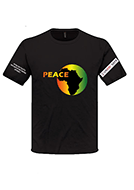
Thank you for giving feedback, taking the time to respond to our quiz, and for liking and following us on social media. AYINET will be giving out T-shirt’s to 5 winners this quarter whose essays we choose to publish in the second edition of our newsletter. Download the Newsletters below for details.
AYINET SAFE Newsletter 2014
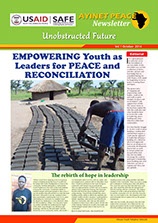
AYINET E-Newsletter
